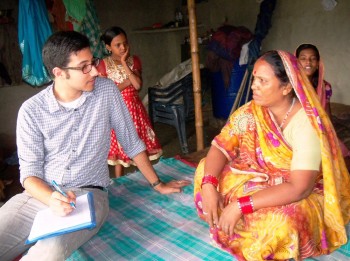Language and Development in India

Robin Banerji' 15 (left) interviewing the president of a self help group in the village of Rahta, in the Madhepura District of Bihar, India.
Details
Linguistics and Economics double major Robin Banerji '15 traveled to Bihar, India this summer to research how the use of language is affecting the success of a development program called Jeevika. Not only do his findings have the potential to serve as the basis for his thesis, they may also generate immediate and straightforward policy recommendations.
Banerji's internship was sponsored by Haverford's Center for Peace and Global Citizenship and was guided by the Social Observatory, a group of researchers evaluating programs funded by the World Bank in South Asia. Jeevika, formally known as the Bihar Rural Livelihoods Promotion Society, is one such program under evaluation. It recruits the poorest women in the area to become members of“Self Help Groups,” which provide access to social support as well as credit and saving networks.
Banerji's research focused on how to best go about Jeevika's new, massive recruitment campaign. Though the organization had previously operated in only a handful of districts in Bihar, it is now expanding to every village in the state's 38 districts. Banerji and his team of survey consultants interviewed over 200 current members in 24 villages in order to find out if there is a correlation between the recruitment messages women receive and how their Self Help Groups end up faring—both socially and financially. He hypothesizes that women who receive messages of social empowerment are more likely to save and lend more, operate more democratically, and become more empowered overall than women who only receive financial incentives.
If Banerji's summer research is approved for his senior thesis, this May he'll be reporting to the Haverford Department of Economics, his supervisors at the Social Observatory, and to the staff at Jeevika. Depending on how the report is received by the Social Observatory, it could become an official World Bank working paper.
—Sam Fox '14



